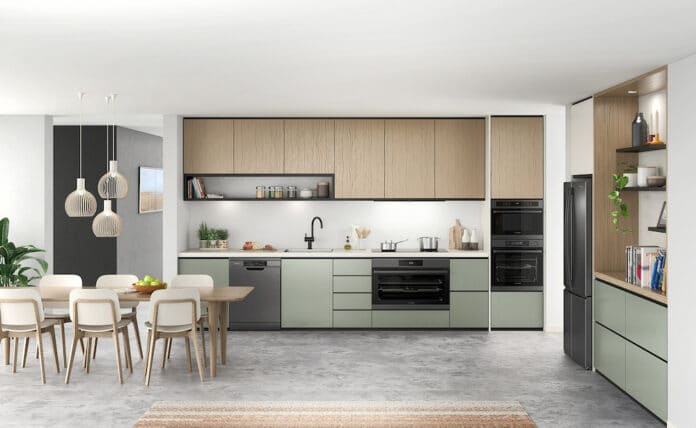
Transforming the world through intentional living by equipping people to clear clutter in their heads, hearts and homes, Amy Revell and Kirsty Farrugia know a thing or two about mess.
Founders of The Art of Decluttering, the duo are experienced professional organisers and declutter coaches who provide services in both Sydney and Melbourne.
Partnering with Westinghouse, Kirsty and Amy have four easy tips to declutter the kitchen: one of the most used spaces in the home.

Don’t jump straight into decluttering
Kirsty says before you think about decluttering, you first need to step back and look at what you love and hate about your kitchen.
“I would look at tidying it up first, getting rid of anything that doesn’t belong,” she said.
“Have a clear vision of what you want to achieve and think about the purpose of decluttering… This will give you a way to move forward.”
Ask yourself questions like “What do you love about your current kitchen setup? Do you have clear storage spaces? What appliances do you need on your bench?” as a starting point.
Do an audit
Knowing what to keep and what items you’d like to find a new home for is as simple as this: if you haven’t used it in 12 months and there are no plans of using it in the next six months, it’s time to go.
“It’s always better to declutter before organising, so get rid of anything you don’t use or that has expired,” says Kirsty.
“The kitchen is precious real estate, so we want to maximise that.”
According to Amy, you should declutter double-ups as well.
“For example, you don’t need a water jug if your fridge has an inbuilt water filter like the Westinghouse 680L French door fridge,” she says.
Follow everyday rules
The kitchen benchtop is designed as a surface to prepare food, not as a purveyor of the blender, toaster, sandwich press, coffee machine, microwave, and so on.
Kristy says that clutter is a magnet and a key tip for the kitchen is to use space and storage well.
“When it comes to organising, having the same style of containers really helps because then they can be repurposed for different things, be stacked together, and they work well in the pantry, fridge and freezer,” said Kirsty.
“Having really good storage can help with evolving household needs.”
Another tip is having commonly use items in easy to access spaces. Amy suggests being selective when choosing what appliances go on the bench and reserving the space for items that get used daily.

“Otherwise, store them in dedicated appliance cupboards or invest in hybrid appliances,” she says.
Be mindful of what goes in the home
Once you’ve decluttered the kitchen, the next challenge is keeping it tidy. Kirsty says one of the easiest hacks is to check what you have before you go grocery shopping.
“Only buy what you need and check what you have before you go to the shops,” she says.
“Meal planning is also really helpful with small storage areas because then you’re not buying random things when you’re out.
“Having a place for everything and having a habit for putting it back in its place is really helpful.”
Amy suggests grouping similar items in the fridge and pantry together.
“You could also get the kids to help create a healthy snack tub, filled with easy access options for when they chorus that they’re hungry. So, the whole family can follow, you may also consider labelling your zones or using storage containers and fridge bins, which will save you time and food waste in the long run,” she says.
For more Lifestyle:








